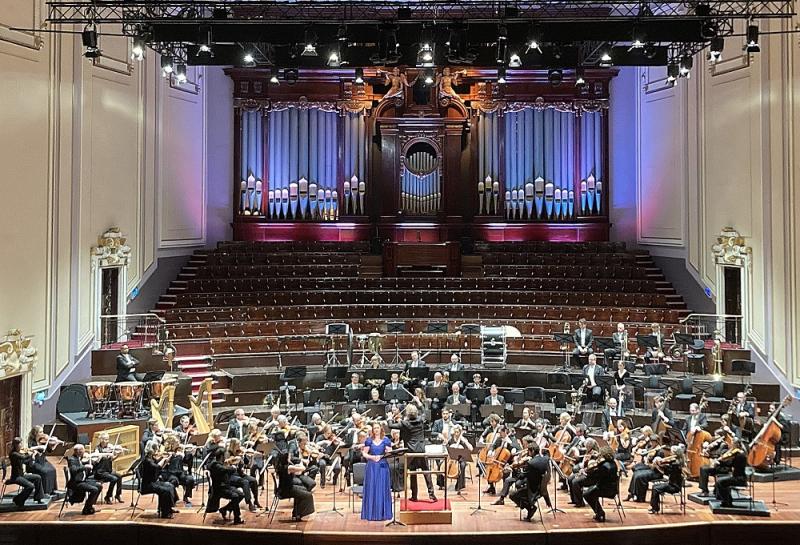Morison, Big Noise Wester Hailes, RSNO, Søndergård, Usher Hall, Edinburgh - shimmering delicacy and surging swell | reviews, news & interviews
Morison, Big Noise Wester Hailes, RSNO, Søndergård, Usher Hall, Edinburgh - shimmering delicacy and surging swell
Morison, Big Noise Wester Hailes, RSNO, Søndergård, Usher Hall, Edinburgh - shimmering delicacy and surging swell
Fine Impressionism from resident orchestra, but young players bring the broadest smiles

While it is an incontrovertibly good thing that the classical music world has set about rediscovering the work of neglected female composers, not all rediscoveries are equally worthy of being found. Particularly on a day like International Women’s Day (IWD), concert programmers run the risk of unearthing work that tends towards the mediocre, and which can end up being tokenistic.
Not on this IWD concert, however. I’d never heard of Mel Bonis (pictured below) until this Royal Scottish National Orchestra concert, but her Trois femmes de légende proved a delight. She studied with Franck in Paris, and Debussy was one of her fellow students, so it’s not surprising that her portraits of Ophelia, Salome and Cleopatra bear a lot of their influences.
 They’re a treat for the ear, though. Ophelia’s music moves with a delicate ripple that reflects her limpid, fragile personality, while Salome’s carries the heat of the Judaean desert with a whiff of heavily-spiced musical orientalism. Cleopatra’s on the other hand, is a constantly rotating sequence, depicting the kaleidoscopic queen at her most colourful.
They’re a treat for the ear, though. Ophelia’s music moves with a delicate ripple that reflects her limpid, fragile personality, while Salome’s carries the heat of the Judaean desert with a whiff of heavily-spiced musical orientalism. Cleopatra’s on the other hand, is a constantly rotating sequence, depicting the kaleidoscopic queen at her most colourful.
The musicians of the RSNO paid Bonis’ music the great compliment of taking it seriously, with some particularly lovely wind solos, and the sense of impressionistic shape-shifting fed into the other French music on the programme. La Mer was an RSNO showpiece under one of their previous bosses, Stéphane Denève, and in the years since they have lost none of their ability to make Debussy’s music ripple and shine like the constantly shifting seascape it depicts. The music’s melding of textures and themes is second nature to them, but what was impressive about conductor Thomas Søndergård’s reading was the way every element was built together with cleanliness and clarity from top to bottom. That also helped a sensationally lovely performance of Ravel’s Une barque sur l’ocean, which was worth the price of admission on its own because of the way it managed to combine surging, swelling forward movement with gorgeous, shimmering delicacy, particularly at the top of the violins.
That also fed into a terrific orchestral reading of Chausson’s Poème de l’amour et de la mer, and star mezzo Catriona Morison sang it with the dark, focused beauty that we have come to expect from her. Not as much expression as you’d have hoped for, though: this reading didn’t change much, so that her singing of the burgeoning optimism with which the text opens sounded uncomfortably similar to the lovelorn loss of the end. That said, during several of the pauses she had to reach for her tissues or drinking water, so she may have been unwell (though there was no announcement), in which case, well done to her for carrying on at all.  However, the broadest smiles of the evening came thanks to two short pieces by Joëlle Broad, played by the orchestra alongside musicians from Big Noise Wester Hailes (several pictured above). This is part of a community music partnership which is effectively Scotland’s answer to El Sistema. The Edinburgh programme is only 18 months old, so that the seven- and eight-year-olds on stage qualify as its senior students, but they played Broad’s simple music with such joy and concentration that it must have brought a grin to the face of everyone in the audience. It’s enough to give you hope for the future.
However, the broadest smiles of the evening came thanks to two short pieces by Joëlle Broad, played by the orchestra alongside musicians from Big Noise Wester Hailes (several pictured above). This is part of a community music partnership which is effectively Scotland’s answer to El Sistema. The Edinburgh programme is only 18 months old, so that the seven- and eight-year-olds on stage qualify as its senior students, but they played Broad’s simple music with such joy and concentration that it must have brought a grin to the face of everyone in the audience. It’s enough to give you hope for the future.
The future of Arts Journalism
You can stop theartsdesk.com closing!
We urgently need financing to survive. Our fundraising drive has thus far raised £49,000 but we need to reach £100,000 or we will be forced to close. Please contribute here: https://gofund.me/c3f6033d
And if you can forward this information to anyone who might assist, we’d be grateful.

Subscribe to theartsdesk.com
Thank you for continuing to read our work on theartsdesk.com. For unlimited access to every article in its entirety, including our archive of more than 15,000 pieces, we're asking for £5 per month or £40 per year. We feel it's a very good deal, and hope you do too.
To take a subscription now simply click here.
And if you're looking for that extra gift for a friend or family member, why not treat them to a theartsdesk.com gift subscription?
more Classical music
 Bizet in 150th anniversary year: rich and rare French offerings from Palazzetto Bru Zane
Specialists in French romantic music unveil a treasure trove both live and on disc
Bizet in 150th anniversary year: rich and rare French offerings from Palazzetto Bru Zane
Specialists in French romantic music unveil a treasure trove both live and on disc
 Scottish Chamber Orchestra, Ibragimova, Queen’s Hall, Edinburgh review - rarities, novelties and drumrolls
A pity the SCO didn't pick a better showcase for a shining guest artist
Scottish Chamber Orchestra, Ibragimova, Queen’s Hall, Edinburgh review - rarities, novelties and drumrolls
A pity the SCO didn't pick a better showcase for a shining guest artist
 Kilsby, Parkes, Sinfonia of London, Wilson, Barbican review - string things zing and sing in expert hands
British masterpieces for strings plus other-worldly tenor and horn - and a muscular rarity
Kilsby, Parkes, Sinfonia of London, Wilson, Barbican review - string things zing and sing in expert hands
British masterpieces for strings plus other-worldly tenor and horn - and a muscular rarity
 From Historical to Hip-Hop, Classically Black Music Festival, Kings Place review - a cluster of impressive stars for the future
From quasi-Mozartian elegance to the gritty humour of a kitchen inspection
From Historical to Hip-Hop, Classically Black Music Festival, Kings Place review - a cluster of impressive stars for the future
From quasi-Mozartian elegance to the gritty humour of a kitchen inspection
 Shibe, LSO, Adès, Barbican review - gaudy and glorious new music alongside serene Sibelius
Adès’s passion makes persuasive case for the music he loves, both new and old
Shibe, LSO, Adès, Barbican review - gaudy and glorious new music alongside serene Sibelius
Adès’s passion makes persuasive case for the music he loves, both new and old
 Anja Mittermüller, Richard Fu, Wigmore Hall review - a glorious hall debut
The Austrian mezzo shines - at the age of 22
Anja Mittermüller, Richard Fu, Wigmore Hall review - a glorious hall debut
The Austrian mezzo shines - at the age of 22
 First Person: clarinettist Oliver Pashley on the new horizons of The Hermes Experiment's latest album
Compositions by members of this unusual quartet feature for the first time
First Person: clarinettist Oliver Pashley on the new horizons of The Hermes Experiment's latest album
Compositions by members of this unusual quartet feature for the first time
 Gesualdo Passione, Les Arts Florissants, Amala Dior Company, Barbican review - inspired collaboration excavates the music's humanity
At times it was like watching an anarchic religious procession
Gesualdo Passione, Les Arts Florissants, Amala Dior Company, Barbican review - inspired collaboration excavates the music's humanity
At times it was like watching an anarchic religious procession
 Classical CDs: Camels, concrete and cabaret
An influential American composer's 90th birthday box, plus British piano concertos and a father-and-son duo
Classical CDs: Camels, concrete and cabaret
An influential American composer's 90th birthday box, plus British piano concertos and a father-and-son duo
 Cockerham, Manchester Camerata, Sheen, Martin Harris Centre, Manchester review - re-enacting the dawn of modernism
Two UK premieres added to three miniatures from a seminal event of January 1914
Cockerham, Manchester Camerata, Sheen, Martin Harris Centre, Manchester review - re-enacting the dawn of modernism
Two UK premieres added to three miniatures from a seminal event of January 1914
 Kempf, Brno Philharmonic, Davies, Bridgewater Hall, Manchester review - European tradition meets American jazz
Bouncing Czechs enjoy their Gershwin and Brubeck alongside Janáček and Dvořák
Kempf, Brno Philharmonic, Davies, Bridgewater Hall, Manchester review - European tradition meets American jazz
Bouncing Czechs enjoy their Gershwin and Brubeck alongside Janáček and Dvořák
 Solomon, OAE, Butt, QEH review - daft Biblical whitewashing with great choruses
Even a top soprano and mezzo can’t make this Handel paean wholly convincing
Solomon, OAE, Butt, QEH review - daft Biblical whitewashing with great choruses
Even a top soprano and mezzo can’t make this Handel paean wholly convincing

Add comment